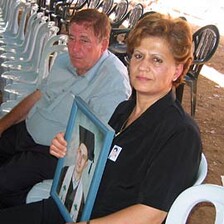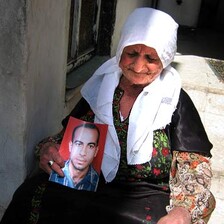Jenin 17 September 2004
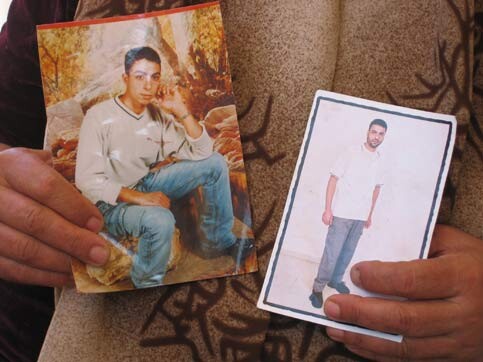
Omar and Ziad. Omar is the one without the beard (Photo: Rima Merriman)
Sleiman Sari al Sa’di (62) has eight children, two of whom, Ziad and Omar, both policemen with the Palestinian National Authority, are in Israeli jails. The Sa’di family comes from al Mazar, one of over 500 towns and villages destroyed after the creation of Israel in 1948. Israelis have typically built Jewish settlements in the immediate vicinity of these villages, often adopting the same names of the Palestinian villages with slight variations and claiming Palestinian village farm lands.
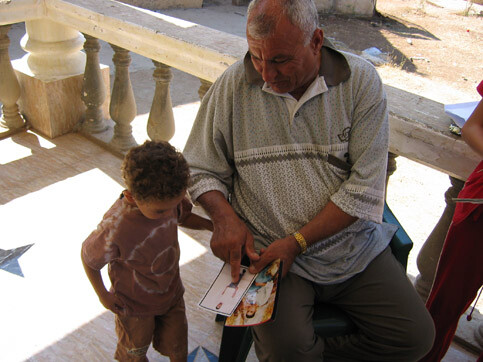
Sleiman showing pictures of Omar and Ziad to one of his grandchildren (Photo: Rima Merriman)
Sleiman currently lives in Jenin (the city), having moved out of Jenin (the refugee camp) 22 years ago. A modestly successful builder, he bought a piece of land, built a house and, as his sons came into their own, started to add living quarters for them close by in the tradition of Arab families. But the oldest, Mohammad, who is an employee at the General Union of Palestinian Workers in Jenin, with four children of his own, is still living in his father’s house. Construction on his place across the yard has been frozen since the first Intifada, when the Israelis issued a demolition order against it. Sleiman’s youngest son Khaled works at a scrap metal shop.

Sleiman al Sa’di on his front porch (Photo: Rima Merriman)
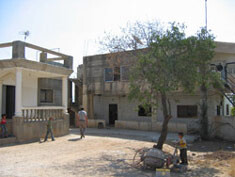
The Sa’di’s family’s home (at left) after moving out of the refugee camp and the quarters (at right) Sleiman built for his sons (Photo: Rima Merriman)
The family has recently lost the 97 dunums of land in Araboneh (south of the destroyed al Mazar) that they had managed to hang onto. The part of the wall that Israel has already built in the far north side of the West Bank has now cut them off from their land.
Omar (29) took part in the fighting during the Israeli invasion and destruction of Jenin refugee camp in April 2002. The siege lasted 14 days and hundreds were killed, including whole families in their homes. Like many others in Jenin, Omar resisted the Israeli invasion of the refugee camp. With light weapons, he fought “Cobra” helicopters raining missiles at night on the densely populated camp, and he fought tanks preceded by bulldozers used to pave the way in the narrow alleys of the camp. He was eventually cornered in al Hawasheem neighborhood, squeezed with his companions into an area of about 80 square meters. He lost consciousness as a result of a hit and was reported dead to his parents, who mourned him for 25 days before learning that he was alive and in Ramallah but being sought by the Israeli army.
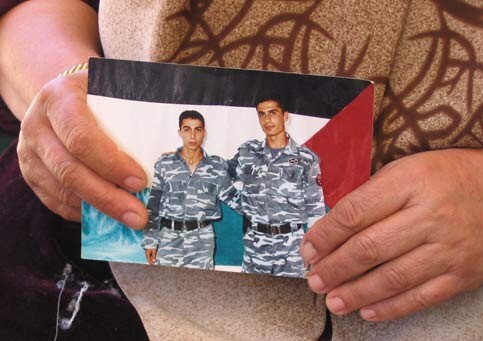
Omar in his uniform (Photo: Rima Merriman)
On October 26, 2002, Omar and Ziad (30) were both arrested at home. Tens of Israeli soldiers came to their house at night, blindfolded and handcuffed Sleiman and all four of his sons along with a male friend (Akram al Sammoudi) who was visiting and took them for questioning at Jalami military camp close by. Omar and Ziad were arrested and the rest were released. For 85 days the family knew nothing of them.
Ziad was accused of belonging to Islamic Jihad, moving explosives, owning a gun (inescapable given his occupation as a policeman), and of shooting at a settler car. Two Israeli “settlements” are on the north west and on the east of Jenin - Gannim and Ginnat. (Ginna means paradise in Arabic and Ginnat is the plural. When a settlement is established, Palestinians simply get notices informing them that they are no longer allowed on their lands. The Israelis disfigure the land by flattening it out and by uprooting trees.) Ziad was sentenced to 9 years plus one more year or a fine of 9,000 shekels (a year’s salary for a policeman). In addition, he was fined 8,000 shekels. The sentence was plea-bargained down from life, or so the family was told by the lawyer, who cost them another 8,000 shekels.
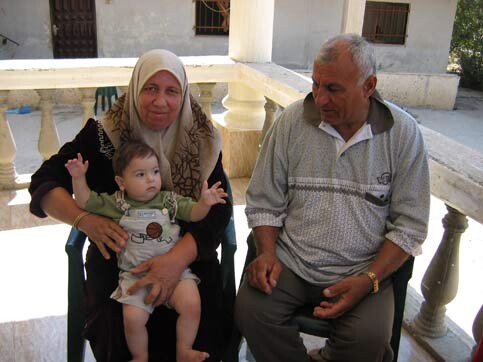
Umm Mohammed, Sleiman with Mohammed’s son, one of their grandchildren (Photo: Rima Merriman)
After his sentence, Ziad was taken to Ofar, then Askalan, then Bir al Sabe’, where he has been in solitary confinement since the discovery of a mobile phone in his possession, which he had used to call his family. It’s almost Ramadan now, a whole year since his family has heard from him or about him. The International Red Cross can only confirm that he is being held in Bir al Sabe’.
Omar was accused of resisting the Israeli invasion of Jenin in April of 2002 and of belonging to Kataeb Shuhada al-Aqsa (“The Al-Aqsa Martyrs’ Brigade”). His sentence was 3 years or two years plus a fine of 4,000 shekels and a reserve sentence of 4 years. His family paid 5,250 shekels to the lawyer who plea-bargained his case. He was imprisoned in Maggido, Ofar and Askalan before ending up in Naqab prison.
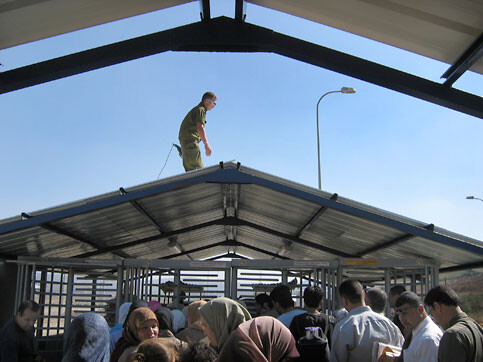
An Israeli soldier is installing turnstiles at the Huwara checkpoint near Nablus, where Omar was rearrested a few days before this photo was taken (Photo: Rima Merriman)
On August 2, 2004, less than a month after his release, Omar was rearrested at the Huwara checkpoint near Nablus. His hearing is on November 2nd. The reserve sentence associated with his previous sentence means that he is guaranteed four years in prison no matter what. Two informers who are currently themselves in Israeli prisons have accused him of being the leader of a group opposing Israel, they themselves confessing to being part of that group. He is also accused of trying to fire in the air near an Israeli settlement and of trying to attack Israeli collaborators. His parents have a document in Hebrew specifying these accusations, but because they can’t read the language, they know only roughly where the names are in the document of those accusing him.
Rima Merriman is a freelance writer and a communications specialist. She has been working in the West Bank for the past four months.
Related links:



